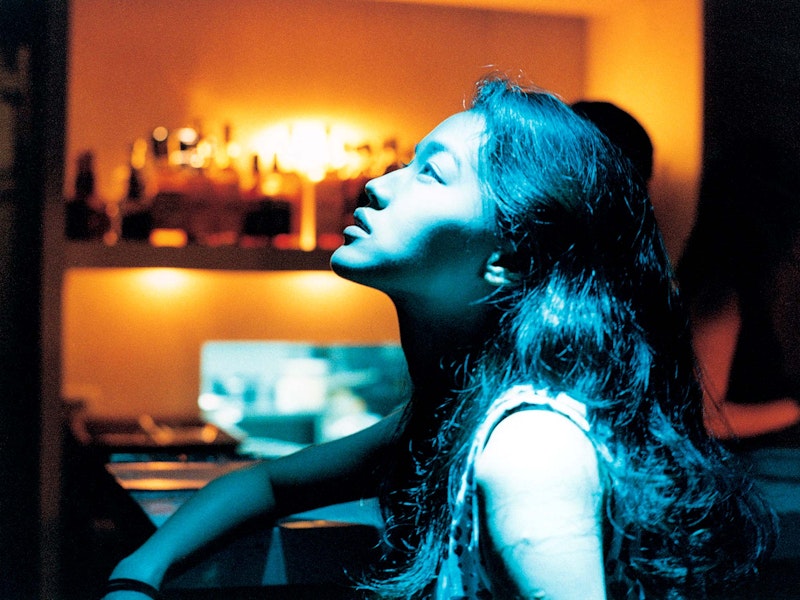Fluorescent lights on a bridge—the spiny curves pull down onto the electric lit columns and a concrete floor. There’s headlights crossing the background. Fluorescent blue bathes the hall. A woman walks in slow motion with a cigarette. We track with her. Synthy drones guide us as an reverberating acoustic guitar kicks in.
This happened 10 years ago, in the year 2001. The world was greeting the 21st century, and celebrating the new millennium…
The opening of Millennium Mambo (2001), Hou Hsiao-hsien’s turn of the (new) century masterpiece, where lead actress Shu Qi walks across the Zhongshan Bridge in Keelung City seems like an image tailor-made for the sleek social media age, and the 4K restoration released last year by Metrograph and Kino Lorber has preserves a cool factor the techno-booming, neon-lit romance about disaffected youth where the future is the present and the present is the past.
The film cuts from its perfectly stylized opening to something much more recognizably Hou Hsiao-hsien: a table full of people and a camera on a swivel head. Vicky (Shu Qi) is sitting up front, covered in blacklight and a brilliant orange glow. The camera, operated by Hou’s regular cinematographer Lee Ping-bing (who’d just worked with Hong Kong director Wong Kar-wai on In the Mood For Love), pans side to side and catches focus on different characters as the conversation bounces between them while they react to a corny magician, who’s framed with his hands in front of Vicky. It’s an expert delicacy with which Hou produces his mise en scene, where a composition is often from a fixed position but the frame itself is never fixed: it tilts and bobs between points of interest, often faces or gestures, as a scene reveals itself by simply unfolding.
Hou’s camera moves like a quiet observer, as if the director himself is watching the sequence from an adjacent table, accidentally catching a glimpse of a profound moment—never an instantaneous profundity, but one that’s experienced gradually, in gentle motion. There’s a unique way of seeing in Hou’s films, one that invites the viewer to experience watching a movie as if they were watching one for the very first time.
I remember the excitement when I first saw Chungking Express (1994), Wong Kar-wai’s crowd-pleasing arthouse romance, as a teenager getting this energetic feeling of discovery, as if I’d finally opened a floodgate and the world of cinematic possibility was now open. A movie could do anything it wanted, it could put a camera where it pleased, play with the shutter speed whatever way was most interesting, tell a story in whatever order gave it the most pop—there were no rules. It’s unimaginable to feel this way again after more than a decade and thousands of movies burned into my memory, but Millennium Mambo somehow drops me back into that well of feeling.
There’s no doubt part of the attraction is the story: a high-intensity on-again-off-again romance between young people who don’t want to do much besides go drinking and dancing. It’s a classic set up for a sappy story reflecting on the volatile yet nostalgic aspects of being a listless twentysomething, yet Hou’s past-is-the-present framing paired with his naturalistic mise en scene creates a more diffuse, ineffable set of emotions rather than going for the obvious gut punches. Vicky will narrate from that 10-year separated perspective about the time her boyfriend Hao-Hao pawned his dad’s Rolex for cash and the police got involved, and then the next scene that sequence unfolds in the ambivalence of real time. There’s the narrative of the film, and then there’s the actual unfolding of it. We get the way a character looks back and tries to understand their feelings about something that happened to them, and then we experience for ourselves the memory not as memory, but as a real incident, captured by an invisible observer in the room.
Millennium Mambo is an invigorating film. Watching Hou’s camera glide between black-lighted club dancefloors and apartments soaked in stylistic yet diegetic blues and yellows seems like the kind of images that are cliched or even crutches for filmmakers that need visual flair to mask their own inability to add dense tonality or thematic weight to their scenes of young lovers not-being-able-to-figure-out-what-they-want-to-do. Somehow, Hou makes these moments come alive, as if they haven’t been filmed a thousand times before and a million times since. Hou makes you feel like you’re watching a movie for the very first time.

